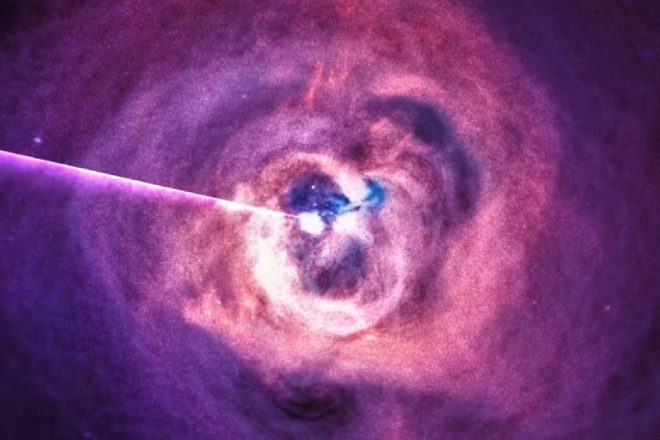NASA's audio clip of black hole likened to Björk and Brian Eno
The space agency's clip of the Perseus galaxy cluster, located 240 million light-years away, has gone viral on Twitter

On Sunday (August 21), NASA released an audio clip of what a black hole would sound like, and some are saying it sounds like Björk and Brian Eno.
The USA space agency tweeted what it called a remixed sonification of a black hole in the Perseus galaxy cluster, located approximately 240 million light-years from Earth.
According to NASA, the sound waves discovered there over two decades ago were "extracted and made audible" this year.
Read this next: Mathematician creates electronic music album using data from black holes
“The misconception that there is no sound in space originates because most space is a ~vacuum, providing no way for sound waves to travel,” NASA wrote on Twitter.
“A galaxy cluster has so much gas that we've picked up actual sound. Here it's amplified, and mixed with other data, to hear a black hole!”
The misconception that there is no sound in space originates because most space is a ~vacuum, providing no way for sound waves to travel. A galaxy cluster has so much gas that we've picked up actual sound. Here it's amplified, and mixed with other data, to hear a black hole! pic.twitter.com/RobcZs7F9e
— NASA Exoplanets (@NASAExoplanets) August 21, 2022
Read this next: Sound on Mars travels at two different speeds, NASA reveal
The video, which NASA referred to as a "Black Hole Remix," was initially made available in early May to coincide with NASA's Black Hole Week, but it wasn't until the NASA exoplanets team tweeted on Sunday that it started to take off, garnering more than 15 million views.
The sound was first detected by NASA's Chandra X-ray Observatory, and the space agency defined it as pressure waves emitted by the black hole at a whopping 57 octaves below middle C.
This suggests that to make the sound detectable, researchers had to elevate the frequency by quadrillions of times.
“Another way to put this is that they are being heard 144 quadrillion and 288 quadrillion times higher than their original frequency,” NASA said.
Read this next: A NASA scientist and a programmer have made music from ocean readings
Kimberly Arcand, the principal investigator of the sonification project, told The Washington Post that she thought the recording sounded like “a beautiful Hans Zimmer score with the moody level set at really high”.
The 34-second clip caught people's attention online and many remarked it sounded much like they expected a supermassive black hole would sound. It has been compared to an eerie cosmic growl or a menacing wind tunnel.
Funny how this sounds like every Black Hole in every science fiction film EVER https://t.co/s9HOwsapFM
— woodrow phoenix (@mrphoenix) August 22, 2022
“Funny how this sounds like every Black Hole in every science fiction film EVER” says one Twitter user.
Others made light of the experimental-sounding nature of this recording, and likened it to electronic producers such as Björk and Brian Eno.
“New bjork sounds amazing”, jokes another user on Twitter. “new brian eno just dropped” jokes another.
Read this next: Science explain why we get chills listening to music
New bjork sounds amazing https://t.co/KKfnxa74kB
— Thiago Guimarães (@orathiago) August 22, 2022
new brian eno just dropped https://t.co/EV8GSL0LW8
— Becky Bartkowski (@beckybartkowski) August 23, 2022
“The universe is moaning and not in a sexy way”, says another person online.
THE UNIVERSE IS MOANING AND NOT IN THE HOT AND SEXY WAY https://t.co/4QGUbpJeRU
— John Scalzi (@scalzi) August 22, 2022
The agency's decision to make the nearly two-decade-old data's "re-sonification" public is a part of its efforts to use social media to explain complicated scientific discoveries to its millions of followers.
Read this next: TikTok video shows mushrooms can make trance like music
"While its fans enjoyed stunning photos of space and behind-the-scenes looks into missions, there was a group of people who wanted to know what space sounded like, too,” the company wrote in a news release.
Last year mathematician and musician Dr Valery Vermeulen made an electronic audio-visual music album made entirely out of data sonification of black holes.
The project is comprised of three tracks, all of which explore the natural phenomena of a gravitational singularity.
Aneesa Ahmed is Mixmag's Digital Intern, follow her on Twitter

Mixmag will use the information you provide to send you the Mixmag newsletter using Mailchimp as our marketing platform. You can change your mind at any time by clicking the unsubscribe link in the footer of any email you receive from us. By clicking sign me up you agree that we may process your information in accordance with our privacy policy. Learn more about Mailchimp's privacy practices here.

